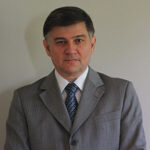6 November
The European legal ground and jurisprudence on freedom of expression and online speech
Hosted by the Escola Paulista da Magistratura (São Paulo School of Judges)
in cooperation with Columbia Global Freedom of Expression
REGISTER HERE* (see instructions below)
The event will be in English and Portuguese with simultaneous interpretation.
Due to the massive use of the internet as a vehicle for the exercise of freedom of expression, resulting in a large number of judicial processes on it in Brazil, and the actual difficulty in implementing effective protection of freedom of expression and at the same time guaranteeing safeguard to other rights that have the same level of constitutional and legal protection, the course objective is to study the current academic and judicial trends on the mentioned subject, nationally and internationally, to assist legal operators in the task of solving the practical problems that have emerged.
Professor Emeritus at University of Gent Dirk Voorhoof and Legal researcher and doctoral candidate at University of Innsbruck Martin Müller will discuss how the European Court of Human Rights has contributed to the protection of the right to freedom of expression and information on the Internet, based on a set of five clusters of cases/issues, including the recent decisions in Sanchez v France and Hurbain v Belgium. Speakers will present the main legal questions raised in the selected cases, as well as the impact of the new European Digital Services Act (DSA) on the subject of content moderation and intermediary civil liability.
The cluster of cases/issues relate to the blocking of websites and of social networking accounts and access to the internet; interference with offensive, radical or extremist online content; interference with the integrity of internet archives; the liability of online media platforms for user-generated content and for hyperlinks; and the protection of journalists’ sources in the digital environment.
Moreover, the new Digital Service Act creates a set of obligations for intermediaries, especially social media, relating to transparency and responsibility for their activities, which will have an impact on content moderation and on the system of intermediaries civil liability for user-generated content.
Moderator:
- Dr. Hamid Charaf Bdine Júnior, São Paulo School of Judges
Speakers:
- Professor em. Dr. Dirk Voorhoof, Ghent University / Human Rights Centre and Legal Human Academy
- Martin Müller, University of Innsbruck
This webinar was made possible with support of UNESCO Multi-Donor Programme on Freedom of Expression and Safety of Journalists (MDP)
*To register for the event, you need to Log in (Realizar Login). Once on the Login page, if you do not have an account on the platform, click on Subscribe now (Inscreva-se agora). Enter your email address, type in your verification code, and press on Verify code (Verificar código). Create (Criar) your account. In the upper right corner under Enrollment (Inscrição), choose Distance (Distância), click Sign up (Inscrever-se), and then press Register (Realizar Inscrição). Fill out the New Profile (Novo Perfil) form to finalize your registration.
 Moderator: Dr. Hamid Charaf Bdine Júnior, São Paulo School of Judges
Moderator: Dr. Hamid Charaf Bdine Júnior, São Paulo School of Judges
Hamid Charaf Bdine Júnior holds Master’s and Doctorate degrees in Civil Law from the Pontifical Catholic University of São Paulo, Brazil. He is a lawyer and retired judge of the Court of Justice of São Paulo. Dr. Hamid Charaf Bdine Júnior teaches at the São Paulo School of Judges, Mackenzie Presbyterian University, and the Pontifical Catholic University of São Paulo.
 Professor em. Ghent University / Human Rights Centre and Legal Human Academy
Professor em. Ghent University / Human Rights Centre and Legal Human Academy
Dirk Voorhoof holds a Master Degree in Law (1979) and Communication Sciences (1980), and a PhD in Law (1990). He was a lawyer at the Brussels Bar (1990-1992), a member of the Federal Commission for Access to Administrative Documents (1994-2005), member of the Flemish Media Council (2005-2012) and member of the Flemish Regulator for the Media (2006-2016).
He was a professor at Ghent University (1992-2016), teaching the courses of ‘Media Law’, ‘Copyright Law’, ‘Journalism & Ethics’ and ‘European Media Law’, both in the Faculty of Law and Criminology and in the Faculty of Political and Social Sciences, Communication Studies.
From 2002-2007 he lectured at the University of Oxford, MLAP (Global Media Law Advocates Programme) and he has been teaching Media Law at Copenhagen University from 2004 to 2017. He is also a guest professor at Luxembourg University in the master programme on Space, Telecommunications and Media Law (since 2017). He is a founding member of the European Centre for Press and Media Freedom (ECPMF, Leipzig) and of Legal Human Academy. He was a member of the Committee of Experts on Internet Intermediaries (MSI-NET) of the Council of Europe (2016-2018). He is also active in the JUFREX-pool of experts (Council of Europe/EU (since 2017) and in the Global FOE&I @Columbia experts network, Columbia University, New York (since 2014).
 Martin Müller, University of Innsbruck
Martin Müller, University of Innsbruck
Martin has been a researcher in the project “European Repository on Cyber Incidents” and a doctoral candidate at the Institute for Theory and Future of Law at the University of Innsbruck since March 2022. He completed his law studies at the Goethe University Frankfurt in 2021 with the first Staatsexamen (“state examination”). During his studies, he worked at Ernst & Young Law in the department of “Digital Law”. His research focuses on European and international law as well as the law of digitalisation.
- Coletânea especial de jurisprudência sobre liberdade de expressão: Tribunal Pleno da Corte Europeia de Direitos Humanos
- Análise jurisprudencial em português sobre liberdade de expressão ao redor do mundo por Columbia Global Freedom of Expression
- Voorhoof D., Freedom of Expression in the Digital Environment: How the European Court of Human Rights has Contributed to the Protection of the Right to Freedom of Expression and Information on the Internet, in Evangelia Psychogiopoulou and Susana de la Sierra (eds.) Digital Media Governance and Supranational Courts, Selected Issues and Insights from the European Judiciary, pp. 112-137 (232 p)., ISBN: 978 1 80220 299, Edward Elgar, Cheltenham, 2022
- Sanchez v. France
- Voorhoof D., European Court of Human Rights (Grand Chamber): Sanchez v. France, IRIS 2023-6:1/15, European Audiovisual Observatory, Strasbourg, 2023
- Voorhoof D., European Court of Human Rights (Grand Chamber): Hurbain v. Belgium
- Voorhoof D. et al and McGonagle T. (Ed. Sup.), Freedom of Expression, the Media and Journalists: Case-law of the European Court of Human Rights, IRIS Themes, European Audiovisual Observatory, Strasbourg, 2023

